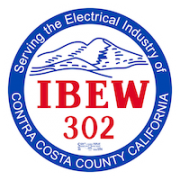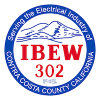Join IBEW 302 and Build Your Career
We’re accepting anyone with 4+ years of electrical experience.
Why join IBEW:
- Better Pay
- Good healthcare
- Job stability
- An excellent retirement
What is a union?
A union is an organization through which ordinary people do extraordinary things. We recognize that when individuals join together and speak with one voice, we have the power to change our situation for the better.
By joining together in the common purpose of improving conditions both on the job and in our lives, union members ensure our community and government leaders are accountable to the well-being of ourselves, our families and our fellow citizens.
Why join Local 302?
Unions are non-profit organizations and members’ dues are for the specific benefit of its membership goals. Union members support each other through actions of mutual aid and protection, collective bargaining for fair wages and benefits, and community participation.
Members have opportunities to participate and have their voices be heard by joining committees, attending meetings, running for office, volunteering for events, and speaking at city council and other local political meetings.
The International Brotherhood of Electrical Workers (IBEW) represents more 750,000 workers in the US and Canada.
IBEW Local 302 believes that all workers should be treated with dignity and respect, compensated fairly for their labor, and work in an environment that is safe and free from harassment and discrimination.
Our founding documents state that, “we shall promote by all proper means the material and intellectual welfare of its members.” This means we support each other and advocate for fair wages, favorable working conditions and the best education in the industry.
It pays to be an IBEW Local 302 member
A group of employees has more power than one employee when negotiating with their employer. As a union member you are paid the same wage for your classification no matter who you are working for, without starting over or having to interview.
A legally binding collective bargaining agreement makes union membership better for workers. Collective bargaining agreements standardize wage rates and other work guidelines (work hours, health and safety, health and retirement) across similar occupations so workers get paid fairly and treated with dignity and respect. It also helps improve working conditions and wages for non-union workers.
As union members we know that “an injury to one is an injury to all,” so we advocate for all working people. Unions have been advocating for minimum wage policies, improved health and safety standards, overtime pay protections, the eight-hour workday, social security, Medicare, unemployment insurance, and more.
Member dues come back to members in the form of higher wages, better healthcare and other benefits, and a healthier community.
The proof is in the numbers. On average, unions:
increase wages by 26% for women and 15% for men, 19% for African American workers, 49% for Latino workers, and 9% for White workers
increase healthcare coverage for women by 32% and men by 25%, workers of color by 34% and white workers by 21%
increase retirement benefits for women by 37% and men by 33%.
IBEW Local 302 shares the commitment made in 1891 by the founding members of the International Brotherhood of Electrical Workers. This commitment is established in the constitution and is found under objects of the International Brotherhood of Electrical Workers:
- To organize all workers in the entire electrical industry in the United States and Canada, including all those in public utilities and electrical manufacturing, into local unions,
- To promote reasonable methods of work,
- To cultivate feelings of friendship among those in our industry,
- To settle all disputes between employers and employees by arbitration (if possible),
- To assist each other in sickness or distress,
- To secure employment,
- To reduce the hours of daily labor,
- To secure adequate pay for our work,
- To seek a higher and higher standard of living,
- To seek security for the individual,
- And by legal and proper means to elevate the moral, intellectual and social conditions of our members, their families and dependents, in the interest of a higher standard of citizenship.
Why become an apprentice, and what does it entail?
Earn while you learn! Local 302 apprentices gain on the job training in parallel with classroom work. Unions increase the skill level of their members by providing free high quality apprenticeship programs and journeyman upgrade classes.
What would you rather have?
Empty promises or a defined program?
Makeshift classes or a nationally recognized curriculum?
Promised raises that never come or guaranteed periodic advancement?
Minimum health coverage or high-quality health care and a guaranteed retirement?
If you’re looking for a meaningful career in the electrical construction industry – one that builds character and pride and offers a bright future – apply today to the IBEW NECA Sound and Communications Apprenticeship. For information on other opportunities check out Electrical Training Programs.

IBEW Apprenticeship Benefits
- Safer working conditions
- Learn while you earn through our no cost apprenticeship
- Pride and dignity at work
- The opportunity to learn all aspects of the electrical industry
- Excellent wages and guaranteed pay increases
- Healthcare and retirement benefits
- State-of-the-art training
There are two ways to become a part of IBEW local 302’s apprenticeship program through the Inside Wireman Apprenticeship and the VDV Sound & Communications Apprenticeship. See below for more information.
Inside Wireman Application Announcement
Sound & Communication Apprenticeship Applications
More information available at www.norcal-jatc.com
Apprenticeship Agreement
Apprenticeship requires a signed agreement between you and the IBEW-NECA, which ensures free quality training both on the job and in the classroom. As an apprentice you literally earn while you learn. As you advance through your training, you will receive predetermined pay increases. In signing an apprenticeship agreement, you commit to participate in classroom related training as well as on the job training.

